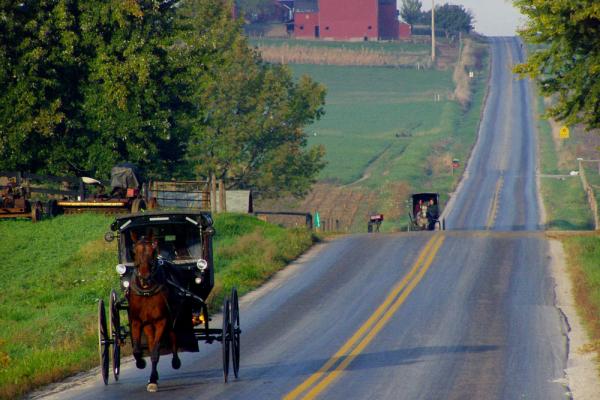HARRISBURG, Pa.—Nothing is sacred about your religion when it comes to getting a state identification card without a photo.
The Pennsylvania Department of Transportation offers ID cards for those with religious objections to being photographed, including the Amish and certain Mennonite groups. But in order to get a nonphoto ID for religious reasons, applicants must answer a series of 18 questions that delve deeply into their faiths and other personal information.
Now that Pennsylvania has passed one of the nation's toughest voter ID laws to prevent voter fraud, the scope of the questions is drawing criticism.
The first item on PennDOT's form asks applicants to "describe your religion." It is followed by more questions that devout followers might struggle to answer, and some that inquire about the lives of family members:
How many members are there of your religion?
How many congregations?
What's the process by which you came to the religion?
What religious practices do you observe?
Do other family members hold the same religious beliefs?
Submitting that form, once notarized, is not enough. Applicants must fill out another form. And if they lack proof of identification, yet another form must be completed before a nonphoto ID is issued.
Going through this process is essential if those who hold religious objections to being photographed want to vote; anyone who wants to vote must show identification in the November election.
Two Republican state senators, both of whom supported the voter ID law, have expressed concerns about what it takes to get a nonphoto ID. State Sen. Mike Folmer said the questions seem intrusive, and he wonders why all that information is needed.
"They are going to be keeping them from the polls, keeping American citizens from the polls," Folmer said. "That's what I'm concerned about."
"That form is an overreach in my opinion," added state Sen. Mike Brubaker. "I don't want persons for religious reasons not to have a photo taken, to go through a process that is any more cumbersome than absolutely necessary to get the proper identification to be able to vote."
Mary Catherine Roper, a staff attorney for the American Civil Liberties Union of Pennsylvania, said some of the questions on the affidavit are relevant to determine if the applicant's beliefs are sincere. But, "I have no idea what the purpose would be of some of the other questions they have here."
PennDOT indicates it has issued nearly 4,000 nonphoto IDs that are currently valid to people with religious objections. Pennsylvania is home to 61,000 Amish.
PennDOT spokeswoman Jan McKnight said the questions on the affidavit were created by the agency's lawyers based on federal and state case law.
"It can't be too simple because we are talking about a legal ID," McKnight said. "We are not here to stand in the way of them getting their ID, but we're just recognizing the fact that this is of such importance to them that they don't want to have their picture taken."
The answers are reviewed by PennDOT personnel and not shared with any other agency, a requirement of the federal Driver's Privacy Protection Act, she said.
Not answering all the questions on the affidavit form is reason for denying the issuance of a nonphoto ID, PennDOT spokesman Craig Yetter said. And there have been denials.
In the past, the Amish have submitted a letter from their bishop affirming their membership instead of completing the affidavit to get the ID card. Those Amish seeking simply to renew a photo ID card once every four years can still rely on a letter from their bishop.
Going forward, new Amish applicants must fill out the PennDOT forms and questions to get an ID. Looking over the questions asked on the affidavit, McKnight agreed that some might seem a bit personal.
"It's hard not to get personal when you are talking about matters of religion," McKnight said.
Donald Kraybill, a senior fellow at the Young Center for Anabaptist and Pietist Studies at Elizabethtown College, said the Amish objection to being photographed is grounded in their beliefs.
The Amish view it as following the Second Commandment "of not making graven images (idolatry) ... focusing on the individual, calling attention to individual, rather than community."
Asking Amish people to fill out an 18-question survey reflecting their religious views will be problematic for them, Kraybill said.
"'Describe your religion' would be difficult for many people, let alone ones with an eighth-grade education," he said.
G. Terry Madonna, a political scientist at Franklin & Marshall College in Lancaster, said a lot of Amish and Mennonites don't vote. When they do, they tend to vote Republican.
Democrats voiced most of the opposition to the voter ID law, saying it could hurt turnout among minority groups and those in cities who don't drive. When the GOP-backed voter ID legislation was being debated, Madonna said at the time that it would be filled with unintended consequences.
"That's what we're seeing here," he said.
Some questions and requirements on the application for a nonphoto ID for religious reasons:
- Does it have sacred texts or commandments? If so, please describe or provide them.
- Does it have ceremonies or meetings?
- Describe three significant requirements or prohibitions of your religion.
- Describe the ways in which your religion affects your daily life.
Jan Murphy writes for the Patriot-News in Harrisburg, Pa. VIa RNS.
Amish buggies, Weldon Schloneger/Shutterstock.com
Got something to say about what you're reading? We value your feedback!
